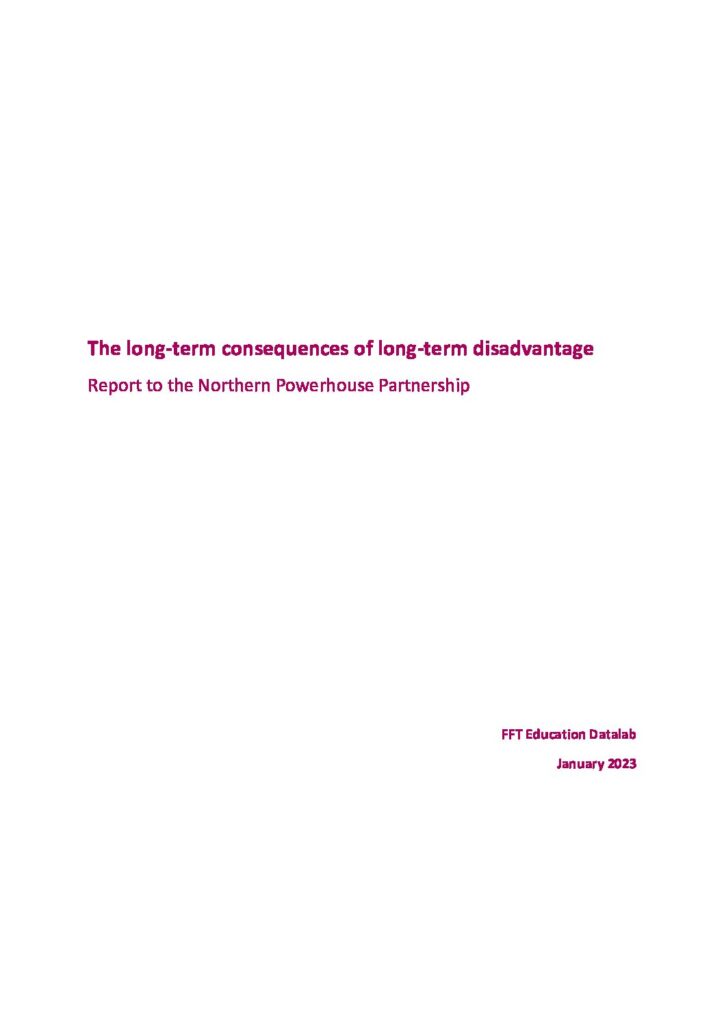Long-term impact of long-term disadvantage
03.01.23
Tackling disparities in education is essential for growth, with 29% of long-term disadvantaged pupils receiving workless benefits at age 22, according to new research from the Northern Powerhouse Partnership (NPP) and FFT Education Datalab.
These young people were around five and a half times more likely to be in this position than those who had never been eligible for FSM (5%).

Long-term disadvantaged pupils are 23% less likely to go on to be in long-term education or employment in early adulthood than their more well-off peers. This is the case in every English region apart from London, where disadvantage was found to have markedly less impact.
While the capital has the highest levels of long-term disadvantage – pupils eligible for free school meals (FSM) for 80% of their school career – students from these backgrounds were only 16% less likely to be in study or work at the age of 22 than those who had never been FSM-eligible.
69% of long-term disadvantaged pupils in London went on to long-term education or employment, compared with just 54% in the North East, which has the second highest level of long-term disadvantage (12%).
Evidence suggests that this is related to ethnic disparities in academic attainment amongst long term disadvantaged children. The report found that disadvantage had hardly any impact on students from Chinese backgrounds, and only a small impact on those from Black African, Indian, Bangladeshi, Pakistani and other Asian backgrounds which have high concentrations in the capital.
In contrast, outcomes among White Irish, White British and Irish Traveller backgrounds and, to a lesser extent, those from Mixed White/Asian and Mixed White/Black Caribbean backgrounds, were significantly lower for those from these least well-off backgrounds.

Previous research from NPP has found that there far greater concentrations of disadvantaged pupils from these high-impact ethnic groups in the North of England, leading to a substantial north-south divide in education.
The proportion of this year’s GCSE results at Grade 7 or above in the North East and Yorkshire and Humber was 22.4%. In London it was 32.6%.
Delivering his Autumn Statement, Jeremy Hunt said that “being pro education is being pro growth”.
Michael Gove wrote in the Times during the Conservative leadership contest in summer that “Central to unlocking potential and improving productivity is further reform of our education system. Our biggest challenge remains the attainment gap between rich and poor.”
Long-term disadvantaged pupils were around half as likely to be undertaking degree-level study as those who had never been eligible for FSM (24% vs 46%).
Lord Jim O’Neill, vice-chair of the Northern Powerhouse Partnership, said: “These disparities in education outcomes are a serious barrier to productivity and growth, particularly in the North of England, and we need solutions now.
“A centralised, Whitehall-diktat approach to the education challenge is doomed to fail. The Opportunity Area programme – one of the only attempts to deal with this issue – was partially effective because it offered bespoke, locally-led solutions in areas facing the biggest challenges. However, it was still nowhere near bespoke enough nor was there enough ambition. Its apparent successor, education investment areas (introduced earlier this year), comes with no local control.
“Poorly-targeted policies and meagre funding will only lead to more lost opportunity and squandered potential. Metro mayors and local leaders more widely would be far better placed to have funding control over these decisions. I call on the government to open their minds and consider the real ways of solving multi-faceted local education challenges.”
Anne Longfield CBE, Chair of the Commission on Young Lives and Former Children’s Commissioner for England, said: “Our education system is still leaving too many children behind, locking them out of future learning and career opportunities.
“The economic case for education investment has never been stronger and this needs to be built into our plan for growth.
“It’s vital we repair the damage done during the pandemic to our young people’s mental health, as well as to their learning. We also need to make sure we’re preparing them for the jobs of the future, such as in digital or the net zero transition.
“Joined-up solutions which tackle interconnected issues such as health and housing in tandem are the best chance we have of closing the long-term disadvantage gap for good.”
Fiona Spellman, CEO of North of England education charity SHINE, said: “It is deeply disappointing to read yet more evidence of the growing divide between the educational attainment of children in the North compared with their peers from other parts of the country.
“Levelling up means nothing if it doesn’t deliver fair opportunities for children. This research shows the scarring effects which long-term disadvantage can have on future life chances.
“Long-term disadvantaged pupils are almost a third less likely to go on to be in long-term education or employment in early adulthood than their more well-off peers.
“Given the concentration of these pupils in parts of the North, it is crucial that areas of disadvantage are given the resource and the ownership locally to tackle the issues facing their communities.”
Media Enquiries
For media enquiries and interview requests, please contact the press office on:
Get involved...
There are a number of ways you can help drive forward the Northern Powerhouse agenda.
Our Members
Working with businesses and organisations across the North















